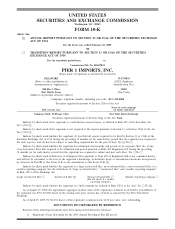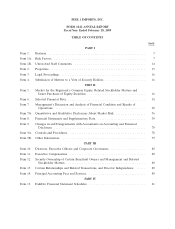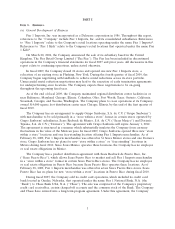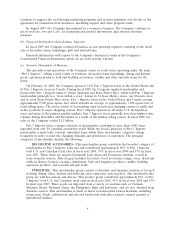Pier 1 2009 Annual Report Download - page 18
Download and view the complete annual report
Please find page 18 of the 2009 Pier 1 annual report below. You can navigate through the pages in the report by either clicking on the pages listed below, or by using the keyword search tool below to find specific information within the annual report.insurance claims processing, U.S. customs filings and reporting, certain payroll processing and tax
filings, and record keeping for retirement plans. The Company makes a diligent effort to ensure that all
providers of outsourced services are observing proper internal control practices, such as redundant
processing facilities; however, there are no guarantees that failures will not occur. Failure of third
parties to provide adequate services could have an adverse effect on the Company’s results of
operations, financial condition, or ability to accomplish its financial and management reporting.
Failure to protect the integrity and security of individually identifiable data of the Company’s customers
and employees could expose the Company to litigation and damage the Company’s reputation.
The Company receives and maintains certain personal information about its customers and
employees. The use of this information by the Company is regulated at the international, federal and
state levels, as well as by certain third party contracts. If the Company’s security and information
systems are compromised or our business associates fail to comply with these laws and regulations and
this information is obtained by unauthorized persons or used inappropriately, it could adversely affect
the Company’s reputation, as well as operations, results of operations and financial condition, and
could result in litigation against the Company or the imposition of penalties. As privacy and
information security laws and regulations change, the Company may incur additional costs to ensure it
remains in compliance.
Regulatory Risks
The Company is subject to laws and regulatory requirements in many jurisdictions. Changes in these
laws and requirements may result in additional costs to the Company, including the costs of compliance as
well as potential penalties for non-compliance.
The Company operates in many local, state, and federal taxing jurisdictions, including foreign
countries. In most of these jurisdictions, the Company is required to collect state and local sales taxes
at the point of sale and remit them to the appropriate taxing authority. The Company is also subject to
income taxes, excise taxes, franchise taxes, payroll taxes and other special taxes. The Company is also
required to maintain various kinds of business and commercial licenses to operate its stores and other
facilities. Rates of taxation are beyond the Company’s control, and increases in such rates or taxation
methods and rules could have a material impact on the Company’s profitability. Failure to comply with
laws concerning the collection and remittance of taxes and with licensing requirements could also
subject the Company to financial penalties or business interruptions.
Local, state, and federal legislation also has a potential material effect on the Company’s
profitability or ability to operate its business. Compliance with certain legislation carries with it
significant costs. The Company is subject to oversight by many governmental agencies in the course of
operating its business because of its numerous locations, large number of employees, contact with
consumers and importation and exportation of product. Complying with regulations may cause the
Company to incur significant expenses, including the costs associated with periodic audits. Failure to
comply may also cause additional costs in the form of penalties.
Risks Associated with International Trade
As a retailer of imported merchandise, the Company is subject to certain risks that typically do not affect
retailers of domestically produced merchandise.
The Company may order merchandise well in advance of delivery and generally takes title to the
merchandise at the time it is loaded for transport to designated U.S. destinations. Global political
unrest, war, threats of war, terrorist acts or threats, especially threats to foreign and U.S. ports, could
affect the Company’s ability to import merchandise from certain countries. Fluctuations in foreign
currency exchange rates and the relative value of the U.S. dollar, restrictions on the convertibility of
11
























